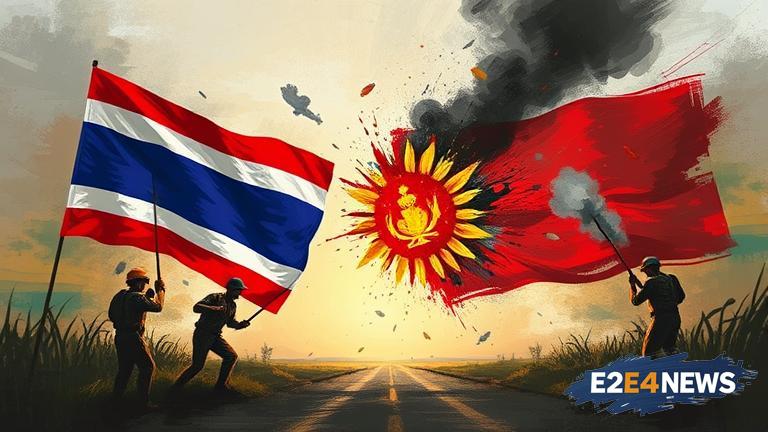The conflict between Thailand and Cambodia has been ongoing for several years, with the two countries disagreeing over the demarcation of their shared border. The tensions have been escalating in recent months, with both sides accusing each other of aggression and territorial encroachment. The dispute centers on the Preah Vihear temple, a ancient Hindu temple located on the border between the two countries. Cambodia claims sovereignty over the temple, while Thailand argues that it is located on disputed territory. The conflict has led to a significant military build-up on both sides, with troops and artillery deployed along the border. The situation has been further complicated by the involvement of other countries, including the United States and China, which have offered to mediate the dispute. Despite diplomatic efforts, the conflict shows no signs of abating, with both countries refusing to back down. The tensions have had a significant impact on the local population, with many villagers forced to flee their homes due to the fighting. The conflict has also had economic implications, with trade between the two countries severely disrupted. The Thai government has accused Cambodia of using the conflict as a pretext to distract from its own internal problems, while Cambodia has accused Thailand of trying to assert its dominance over the region. The dispute has been taken to the International Court of Justice, which has ruled in favor of Cambodia, but Thailand has refused to recognize the verdict. The conflict has led to a significant deterioration in relations between the two countries, with diplomatic ties strained to the breaking point. The situation remains volatile, with the potential for further escalation always present. The international community has called for calm and restraint, but so far, neither side has shown any willingness to compromise. The conflict has also had a significant impact on the region as a whole, with other countries in Southeast Asia watching the situation with concern. The Association of Southeast Asian Nations (ASEAN) has offered to mediate the dispute, but so far, no progress has been made. The conflict is a reminder of the complex and often fraught nature of international relations in the region. The situation is being closely monitored by the international community, with many fearing that it could have far-reaching consequences. The conflict has also raised questions about the role of the international community in resolving disputes between nations. The situation remains uncertain, with the potential for further escalation always present. The Thai and Cambodian governments must work together to find a peaceful resolution to the conflict, one that takes into account the interests and concerns of both sides. The international community must also play a role in supporting diplomatic efforts to resolve the dispute. Only through dialogue and compromise can the conflict be brought to an end and the region returned to a state of stability and peace.
